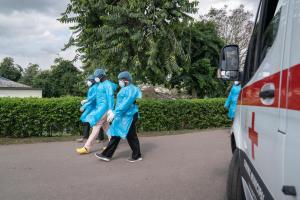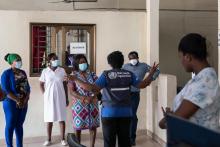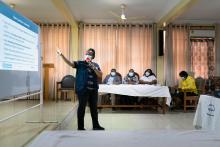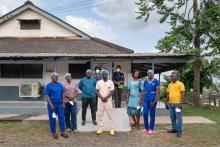Beating Marburg virus outbreak: Ghana’s journey to victory
Accra - “We have been managing cases of outbreaks such as COVID-19, but Marburg raised the stakes much higher,” recounted Dr Joseph Darko, the Case Management Lead at the Apinto Government hospital in Ghana’s Western Region, where the third Marburg case was successfully managed. “Despite the fears, we were determined to outsmart the virus in Ghana together with our partners.”
An outbreak of Marburg virus disease (MVD) was declared in Ghana on 7 July 2022, after a test on an index case who died 24 hours after presenting to a health facility in the Ashanti region with symptoms of Viral Hemorrhagic Fevers (VHF) returned positive after his death.
This was yet another public health challenge that was going to confront Ghana’s healthcare system. However, the country’s public health emergency preparedness and response system gallantly stood the test of the Marburg Virus thanks to the swift response of the Ministry of Health and the Ghana Health Service with support from WHO and other partners, which later led to a declaration of the outbreak over on 16 September 2022.
For the WHO Representative to Ghana, Dr Francis Kasolo, Ghana’s response to MVD is a dividend of preparedness and response driven by multi-stakeholder collaboration through the “one health” approach, an integrated, unifying approach to balance and optimize the health of people, animals and the environment.
“In general, the response to this Marburg virus disease outbreak demonstrates how early alert and response, strong surveillance, community involvement and participation, and coordinated efforts can stop an outbreak in its tracks before it ravages communities”, said Dr. Kasolo.
Whilst health authorities were already dealing with several outbreaks including COVID-19, yellow fever, polio, and monkeypox, the Ministry of Health and the Ghana Health Service activated the Emergency Operations Center to effectively coordinate response activities to the MVD outbreak and avoid escalation of cases in the three at-risk regions, Ashanti, Western and Savannah regions, with preparedness activities taking place across the remaining regions of Ghana.
The Government of Ghana mobilized support from partners and stakeholders including the Ministry of Food and Agriculture and the Wildlife Division to quickly implement measures that will sharply break the chain of transmission, manage affected cases to reduce mortality and morbidity, whiles ensuring continuity of health services and equitable dedication to other ongoing health emergencies.
WHO supported the Ministry of Health and the Ghana Health Service with coordination, contact tracing and identification and management of cases. The Treatment Center in the Western Region that successfully managed the surviving patient had benefitted from a simulation exercise a few weeks before the outbreak.
“The response to Marburg virus was not only swift, but it was also comprehensive and nationwide”, Dr Franklin Asiedu-Bekoe, Director of Public Health of the Ghana Health Service recalled. “The support from WHO and other partners enabled us to enhance surveillance, break the chain of transmission and actively managed cases”.
Given the efforts of the Government of Ghana and its partners, it is not surprising that, on 16 September 2022, Ghana declared an end to the MVD outbreak, nearly two months after the first case was confirmed. The declaration was made after no new cases were reported over the past 42 days in accordance with WHO guidelines.
Dr Sally-Ann Ohene from the WHO Emergency Preparedness and Response in Ghana, believes other countries can learn useful lessons from Ghana’s latest public health milestone.
“The lesson in Ghana’s response to the Marburg Virus Disease outbreak is clear; we must leverage stakeholder collaboration to build resilient surveillance structures at all levels and put systems in place to activate them in the quickest time when the need arises.” Noted Dr Ohene.
To guard against future outbreaks, WHO and the UK Foreign, Commonwealth and Development Office (UK-FCDO) are supporting the Government of Ghana to conduct a socio-ecological study on the MVD in Ghana to better understand the risks within the country for mitigation intervention to prevent a recurrence.



